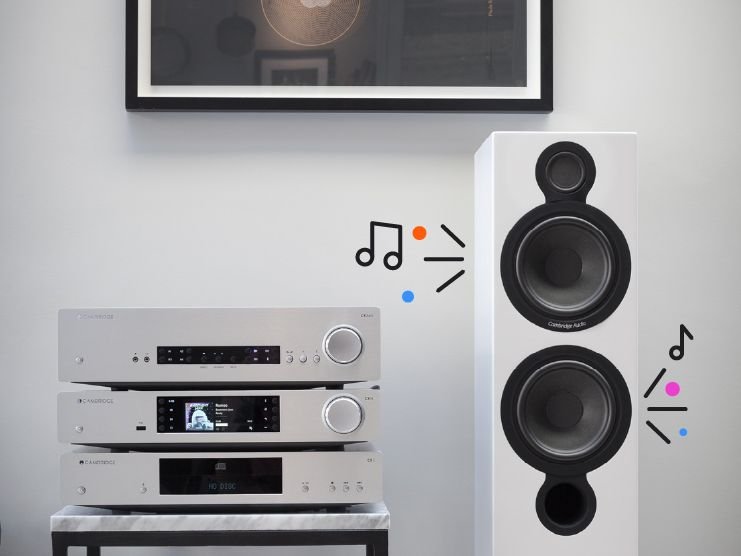
Overview
Challenge
To find a trusted, reliable cloud platform provider with automation capabilities, timely security updates, and compatibility with Drupal and numerous other frameworks that could power an ecommerce website.
Solution
A hosting platform with automated updates, automated scaling, 24/7 community and support, compatibility with multiple frameworks for easy onboarding of new developers, and a significant boost in security and data protection.
Results
- Average ticket response time: 9 minutes
- Total deployments: 2,592
- Deployment success rate: 99.9%
- Friday deployments: 16.5%
Since 1968, Cambridge Audio has been developing high-end audio equipment to represent the true nature of sound to music enthusiasts around the world. From earphones and entry-level hi-fi systems to advanced speakers and premium setups, Cambridge Audio has won numerous awards that attest to the quality and value of its products.
For more than eight years, Povilas Uogintas has served as Cambridge Audio’s lead web developer. He’s been through many technical ups and downs with the company and knows the needs and challenges of managing its web presence by heart.
A major challenge Uogintas faced was finding a reliable hosting platform. The previous provider offered inconsistent support, which forced Uogintas’ development team to focus on infrastructure and vendor maintenance rather than building new features. Early in 2018, he decided to switch to a solution with Platform.sh.
Seamless implementation through native Drupal support
Uogintas reflects on some of the difficulties he and his team had faced with Cambridge Audio’s previous hosting provider. While it controlled the server and server management, the company wasn’t responsive enough to his team’s needs.
“It was not efficient. Infrastructure simply was not there. We had to make PHP security updates and update everything ourselves,” Uogintas explains. “The whole updating process was archaic, something by the way of dropping FTP files. They didn’t really manage it. We needed to check everything all the time and ask them to make necessary updates. And they did—when we asked them. But it wasn’t the modern way of working. Nothing was connected.”
Uogintas began searching for a solution that would enable the Cambridge Audio team to shift its focus back to enhancing website functionality and delivering new features, instead of dealing with basic, mundane tasks. He wanted a provider that could offer automation and clear documentation. Recalling Platform.sh from a Drupal Camp London event, he started to compare its offerings to several other cloud solutions.
After evaluating many options, he chose Platform.sh.
“I liked that the documentation was more focused on developers,” Uogintas says. “Other documentation I saw was more about website builders and other things. Overall, I trusted Platform.sh more.”
Cambridge Audio has been using Drupal for its online store, but is also able to pull orders from external ecommerce sites like eBay and Amazon. Platform.sh was one of the first platforms that natively supported Drupal, which simplified the integration of Platform.sh with the developer workflow.
“Getting started was easy,” explains Uogintas. "The initial setup was already done, we just needed to learn a few new things, but it was not difficult at all.”
Gaining more time, flexibility, and security for developers
Since Cambridge Audio adopted Platform.sh as its hosting solution, Uogintas says that developer productivity has improved significantly. His team doesn’t have to manage as many manual tasks as before, and can now focus on delivering new features to customers faster.
One of the most helpful Platform.sh features to Uogintas’ team of three full-time developers, QA engineers, and contractors has been the branching feature.
“Spinning environments locally has historically been a hassle,” Uogintas explains. “But since we started hosting sites on Platform.sh, we can easily create a new branch, download data, and quickly copy a website, perform our testing, share our testing, share the testing to everybody, and then deploy all the changes upstream to the live site. That elevated us.”
The ability to test features on work environments associated with the branches has been especially helpful to identify bugs, improving the development team’s efficiency. Previously, the team tested new developments sequentially on a single test site—which slowed down their workflow. Now, they can test multiple new features in parallel.
“We can create different branches, and we can create different security layers to make sure no business is going to be exposed. We can hide all sensitive things there and not allow anybody to poke around or copy anything. That’s a feature I wouldn’t know what to do without, from a security standpoint.”
Povilas Uogintas
Lead Web Developer
Cambridge Audio
Aside from faster and more frequent deployments, the branching feature also enables new developers to onboard quickly and progress through workflows more efficiently.
“If new contractors come in, we can create new branches in no time and set them up quickly and securely,” Uogintas explains. “They can do whatever they want in their own environments and not influence anything on the live site. And if you have a bigger team with lots of developers, it’s quite easy to create different users for different branches.”
An adaptable solution to react to traffic, improve efficiencies
Uogintas says the ability to scale infrastructure whenever needed has been a tremendous benefit. If a site slows down when traffic volume increases, it’s been easy for Cambridge Audio’s sites to react quickly, scaling up to accommodate changing demand.
“The scaling options are more or less limitless. It’s easy to do. In the past, our site was misbehaving for different reasons,” Uogintas points out. “Historically, if we had more traffic, we couldn’t do anything. We couldn’t increase our service in a couple hours. But last Black Friday, for example, we were able to scale up one or two levels above.”
Cambridge Audio’s website has been doing so well in fact, Uogintas and his team is upgrading their Platform.sh service to a higher tier.
“We’ve upgraded to d-24, the Enterprise level. We’re scaling up,” Uogintas says. “More users are using our website, more applications are being used. Our customer base is growing, which increases demand on our servers which need to be stronger, faster, better. The more things that need to happen on the site, the more we scale up as a business.”
24/7 support and better security in a post-pandemic reality
Uogintas praises not only the technical features of Platform.sh, but also commends its support team for commitment and responsiveness.
“We used to use the Slack channel. It was great. You had a problem, somebody pings you and solves the problem. But ever since we moved to Enterprise, we rely on your support, which is great. If we have issues, we raise tickets. Then that gets escalated and we get the answer we want,” Uogintas says. “It’s great.”
Uogintas says he worries less about cyber attacks and security issues, too, which was a major reason he and his team decided to expand the use of Platform.sh to other websites and across multiple projects. To keep sensitive data outside of the code, Uogintas leverages Platform.sh variables.
“Let’s say our system has some website credentials, you can create variables, and they’re securely saved and stored with Platform.sh,” he explains. “So if our code ever gets stolen for some reason, all the variables are secured, which is nice.”
Uogintas also reveals that despite the COVID-19 pandemic changing how we live, work, shop, and interact with one another, things have been pretty good for him and his team at Cambridge Audio.
“Everybody works from home now. Before, all the developers came to the office. Because we use Platform.sh, we can work from anywhere. We can just get a laptop going anywhere, essentially,” Uogintas says. “And that’s allowed us to hire developers from anywhere in the world.”
He also points out that during pandemic lockdowns people reevaluated their home audio equipment and decided to upgrade, which provided a boom in business for Cambridge Audio.
“Websites have a lot of things going on, there’s a lot running behind the scenes to keep them going 24/7. All that means energy, and impact on the environment. That’s one of the reasons I’ve also been looking into Platform.sh, in terms of how green it is, and how it’s going in the same direction as our company.”
Povilas Uogintas
Lead Web Developer
Cambridge Audio
“It was a rough time, but people still wanted to enjoy their music. So that’s why we’ve had to upgrade, in that regard,” Uogintas says. “And we’re moving into a more green-conscious, sustainability frame of mind, because it’s the right thing to do and that’s something Platform.sh can help with.”
Overall, Uogintas concludes that his team’s development workflow has become easier and faster than ever before since Cambridge Audio moved to Platform.sh.
“In general, we’re happy with Platform.sh,” he says. “We’re happy with the service, and we’re happy with where we are now.”
 Switching to Platform.sh can help IT/DevOps organizations drive 219% ROI
Switching to Platform.sh can help IT/DevOps organizations drive 219% ROI Organizations, the ultimate way to manage your users and projects
Organizations, the ultimate way to manage your users and projects




